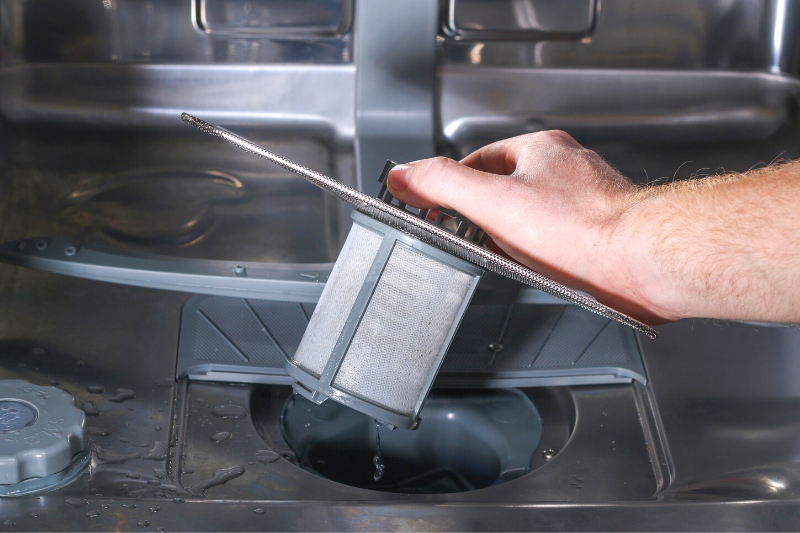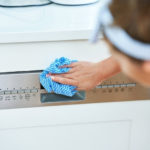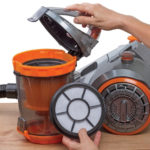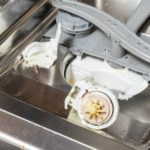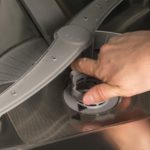A dishwasher is an appliance that many people cannot live without. However, because the dishwasher’s job is to wash your dishes, it’s often forgotten that dishwashers themselves need to be cleaned too!
One key component that particularly needs frequent cleaning is the dishwasher filter. This small but essential part helps catch any food bits and debris that accumulate in your appliance, allowing it to clean your dishes properly.
Unfortunately, these particles will clog the filter if not regularly removed, leading to serious consequences.
In this article, you’ll learn how to clean a dishwasher filter so that this doesn’t occur.
We will also guide you on how regularly the filter needs to be cleaned and provide a brief rundown of some of the issues you may face if it becomes clogged.
What’s the Best Way to Clean a Dishwasher Filter?
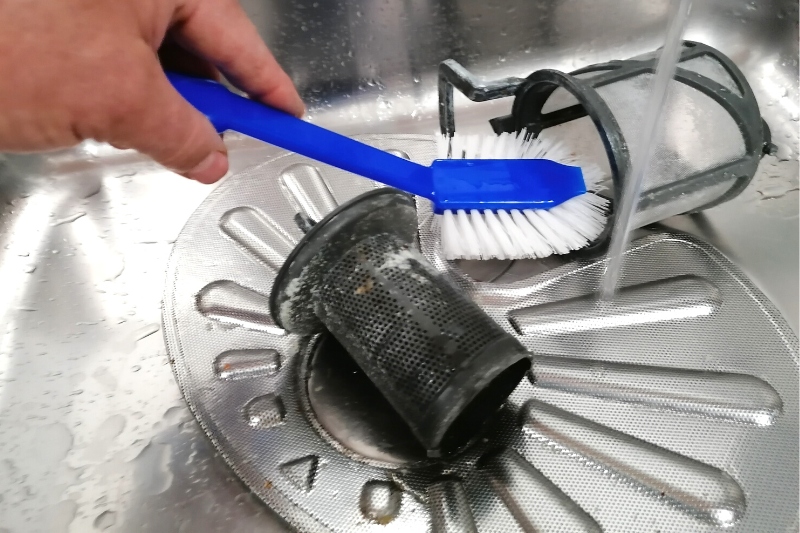
If you’ve never cleaned your dishwasher filter before, it may seem like a daunting task.
Fortunately, it’s a very straightforward process that doesn’t require any special cleaning supplies and typically won’t take up more than 10 minutes of your time.
Follow the below instructions for the best results:
- Step 1: Locate the filter – Every dishwasher has a filter. Most filters are located in the base of the dishwasher, underneath the spray arms. If you have trouble finding it, your instruction manual will have directions for locating and removing it from your appliance.
- Step 2: Remove the filter – To thoroughly clean your filter, you need to remove it from the dishwasher. You can usually do this by simply twisting the component and lifting it out of its housing. There will be arrows around the filter to direct you on which way to turn it.
- Step 3: Clean with washing up liquid – Fill your sink with warm water and mix in a bit of washing up liquid so that suds start to form. Soak the dirty filter in the soapy water for a few minutes to loosen the debris, then scrub with an old toothbrush to remove it. Rinse off any residue with hot water.
- Step 4: Wipe the filter housing – Soak a sponge in the soapy water and use it to wipe out the area where the filter usually sits. Food particles that weren’t attached to the filter often accumulate here and must be removed before the filter is replaced.
- Step 5: Replace the filter – Place your clean filter back into the base of the dishwasher so that it is ready to use once more. Ensure you lock it into place so that it doesn’t come loose. Check your dishwasher instruction manual for specific directions if needed.
How Often Should You Clean the Filter in a Dishwasher?
The filter needs to be cleaned more regularly than any other part of your dishwasher because it is designed to catch all of the loose food particles and debris inside the dishwasher so that they don’t cause a clog further down in the plumbing.
Unless you have a self-cleaning filter, it will need to be cleaned manually. For the best results, this needs to be done at least once a month. But, of course, this can vary slightly based on how often you use your dishwasher and how dirty your dishes are.
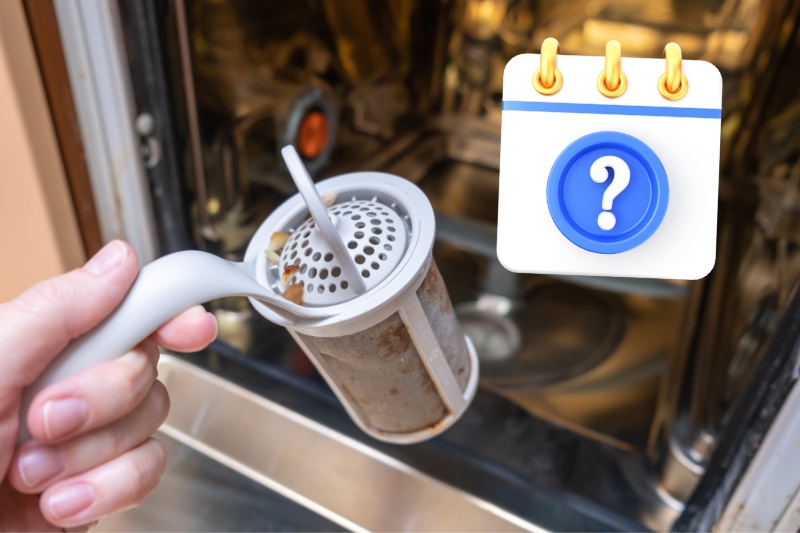
The easiest way to extend the period between deep cleans is to scrape your dishes of any large chunks of food before loading them in the racks.
You can also rinse your dishes to remove all the food particles. However, this can use up to 1,115 litres of water a year, so you may want to skip this if you want to be more environmentally friendly.
What Happens If You Don’t Clean Your Dishwasher Filter?
Unless you specifically go looking for your dishwasher filter, you may not notice that it has become filled with unwanted food bits.
Unfortunately, this can lead to clogs and the growth of harmful bacteria that will impact the effectiveness of your dishwasher and reduce its lifespan.
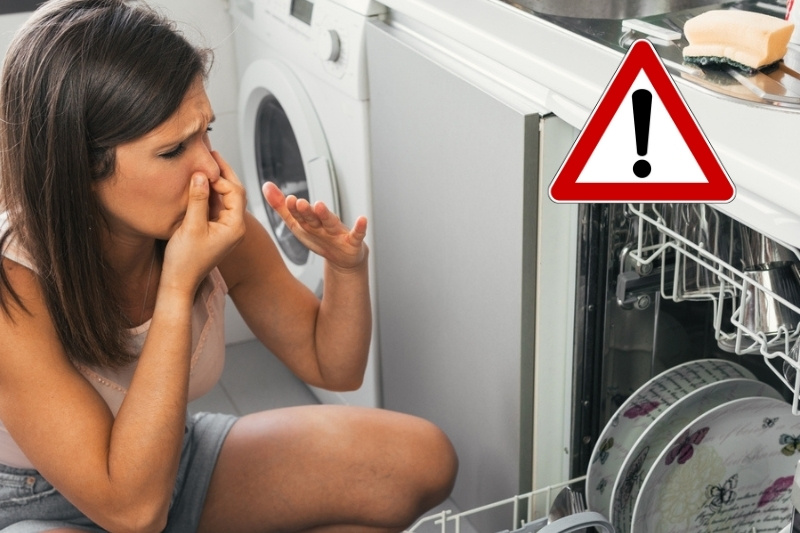
Some of the most common problems that can arise include:
- Unpleasant odours: When food particles are left to sit in your filter for a long time, they will start to decompose. This leads to the growth of odour-causing bacteria that give off an unpleasant smell from your dishwasher. Unless these food bits are removed, the smell will continue to get worse.
- Dirty dishes: If your dishwasher filter is filthy, the water jets will pick up some of the food particles trapped inside during a cleaning cycle. These bits will then be re-deposited onto your dishes, meaning they will come out of the dishwasher still looking grubby. They may also have picked up the unpleasant odour.
- Drainage issues: Over time, the amount of debris in your dishwasher filter will build up so much that it will cause a clog in the appliance’s pipes. This prevents any water in the dishwasher from draining properly, so you’ll often find pools of stagnant water in the base of the machine following a cleaning cycle.
Although these issues can have several causes, the most common culprit is a dirty dishwasher filter. This is why we suggest you regularly deep clean your filter and remove any unwanted debris from the dishwasher.
If you’re already experiencing any of these problems, try cleaning your dishwasher filter before calling out a plumber. This will often rectify the issue without the need to pay a professional. However, there will be times when a more serious underlying problem is responsible.

Hannah has a passion for cleaning. She worked her way around Australia by cleaning hostels in exchange for free accommodation and used her cleaning skills to bag a job as a chalet host for a luxury ski company in France.
